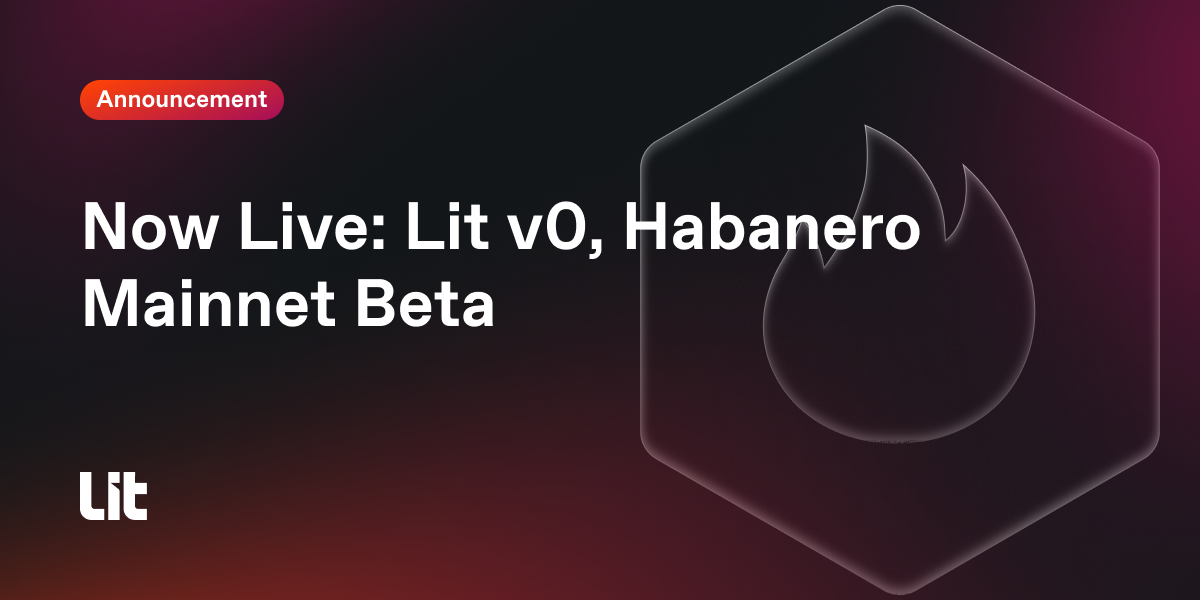Introducing Decentralized Key Management with Lit v0
Lit v0 is live.

Read the thread on X: https://x.com/LitProtocol/status/1757051352365109695?s=20
After three years of research and development, Lit Protocol, the first of its kind decentralized key management network and developer platform, is now live and managing real world assets. Powered by threshold cryptography and encrypted virtualization, Lit enables developers to create and manage keys for almost any use case that demands privacy, immutability, and automation. This includes user onboarding, private social, data marketplaces, transaction automation, data oracles, cross-chain messaging, and almost anything else that can be dreamt up, all without ever having to place trust in a centralized intermediary or custodian.
Today, with the launch of Lit v0, which includes the Habanero Mainnet Beta and Manzano Testnet, Lit moves one step closer to accomplishing its founding mission: to make the Internet more user-friendly and secure by eliminating the need for trust to be placed in a centralized intermediary or single point of control.
Quick Links
- You can view the audited, open source node code on GitHub. The Lit whitepaper can be viewed here.
- For teams deploying in production, you can follow these instructions to install the Lit SDK v3 and use the Habanero Mainnet Beta.
- The Habanero network has limited capacity. If you’re building in production and want to use the network without restrictions, please fill out this test token request form.
For Developers
Early-stage development and testing
If you are currently in early-stage development, you should be using the Manzano Testnet. Sending, receiving, and managing real world assets on Manzano is NOT recommended.
In order to deploy to Manzano, you’ll need to connect to the appropriate branch using the v3 SDK. If you haven’t yet upgraded to v3, you can do so following these instructions. Previous versions of the SDK will not be supported.
Once you’ve installed the latest version of the Lit SDK, you can follow this guide to learn how to perform re-encryption or re-mint PKPs on the Manzano network.
To make requests on Manzano you’ll need capacity credits. Capacity credits can be minted using testLPX tokens. These tokens are valueless and can only be used to pay for capacity on the mainnet beta and testnet. You can acquire testLPX from the Lit Protocol faucet.
Data Persistence
Please note, Habanero is a mainnet while Manzano is a test network. Production applications should be deployed on Habanero, where data persistence is guaranteed. Manzano should be used for test applications where data persistence is not guaranteed.
Deploying Production Applications to Habanero
The keys created and managed on the Habanero Mainnet Beta are ready to be used for deploying production applications. This means that sending, receiving, and managing real world assets IS supported. Any keys that are created on the Habanero network are persistent and will not be deleted, though key migration will be required when the v1 network is released later this year.
In order to deploy to Habanero, you’ll need to connect to the appropriate branch using the v3 SDK. If you haven’t yet upgraded to v3, you can do so following these instructions. Previous versions of the SDK do not support Habanero.
If you are already using the latest version of the Lit SDK, you can follow this guide to learn how to perform re-encryption or re-mint PKPs on the Habanero network.
Looking Ahead
Network performance will continue to be monitored closely, and future upgrades will be aimed at improving transaction speed, throughput, and the Lit network’s ability to scale. If you have any feedback, suggestions, or are dealing with a bug, please reach out to the Lit development team on Discord or get in touch using this contact form.
Supported Functionality
Lit v0 let’s developers create and manage decentralized keys for:
- Access Control: Control access to private data with client-side encryption and flexible access control rules, granting decryption rights to those who meet the on or off-chain conditions you set.
- User Wallets & Claimable Keys: Empower your users with seamless onboarding experiences with embedded and non-custodial wallets. Deliver seamless account creation, recovery, and user-centric security features, all without worrying about custodying private keys.
- Serverless Signing: Create immutable functions that support event-based signing and automated transaction execution.
$LPX, the Lit Protocol Network Token
During Lit v0, a testnet token (testLPX) will be used as gas on the Chronicle rollup, as well as to pay for requests using capacity credits. This token is valueless and should be treated solely as a test token. Chronicle will be deprecated when the Lit v1 network and liquid token are released later this year.
The eventual Lit token, LPX, will be deployed as an ERC-20 on the Ethereum blockchain. The token will play a multi-faceted role in securing, governing, and managing usage on Lit:
- Work token for nodes: The token primarily functions as a work token for Lit nodes. Node operators stake tokens and host the machines that power the network, earning programmatic token rewards for their service.
- Paying for services on the network: The token will be used to purchase capacity credits and pay for requests on the network, as well as serving as the gas token on the Chronicle rollup.
- On-chain governance: Token holders will have the power to influence development and steer the direction of Lit through tokenized governance. More information on the Lit DAO will be released soon.
- Delegation: Token holders will be able to contribute to the economic security of the network by delegating their tokens to a node operator of their choosing, in return being eligible to receive a share of network revenue.
The reason for launching Lit v0 with mainnet keys but a testnet token is in service of prioritizing the resilience of the underlying network itself. Focus has remained squarely on conducting rigorous testing, software and hardware audits, and performance optimizations prior to releasing a live token. This methodical progression is in keeping with a commitment to long-term sustainability and success, aligning with the best interests of all future ecosystem participants and stakeholders.
Participating Operators
Lit v0 is backed by a diverse and committed set of node operators, including ecosystem partners, early adopters, and pioneers in the field of distributed systems. In return for staking tokens and running the hardware that powers the network, Lit node operators receive programmatic token rewards. These partners are instrumental in bringing Lit’s transformative vision to life and helping usher in the user-owned web.
A huge thanks to the teams at 1kx, Terminal3, Collab.Land, Streamr, Bware Labs, Molecule, Imperator, 01node, CMT Digital, Hypha, Cheqd, Everstake, the Oregon Blockchain Group, ETHGlobal, Edge and Node, Waev, Zerion, DoraHacks, gumi, HireNodes, Gitcoin, CyberConnect, Thunderhead, PatchWallet, Orbis, Nethermind, and Lavender.Five for their participation as Habanero and Manzano node operators.
Please fill out this form if you are interested in running a Lit node.
Use Cases and Examples
You can use Lit to power many different applications and use cases, including:
- Private and permissioned data for open data marketplaces: Open data marketplaces facilitate the exchange of data between individuals and organizations, allowing users to buy, sell, or share information in a secure and transparent manner. These systems promote data-driven innovation by making diverse datasets accessible to researchers, developers, and businesses, while also providing data creators with the opportunity to monetize their own content through permission-based access controls.
- User-owned social and identity graphs: Users are empowered with full control over how their personal data is managed on the Web, shifting power away from centralized corporations to the individuals themselves.
- Seamless user onboarding and WaaS: Lit enables the use of web2 authentication and sign-on flows (such as email, SMS, Discord oAuth, and Passkeys) to be used during the wallet creation process. This serves to create easier onboarding experiences for non-crypto native users by abstracting away seed phrases and complex private key management, while also providing the full web3 capabilities of an EOA.
- Automation for web3: Lit can be used to automate interactions with blockchain ecosystems through condition-based transaction execution. This facilitates use cases such as on-chain limit orders or recurring payments that don’t require manual input (i.e. signing off on the transaction) from the end user.
Here are some of the projects building with Lit today:
Developer Tooling: Projects like Alchemy, Pimlico, Openfort, Lens Protocol, Orbis, Spheron, and Snowball are using the generalized services provided by Lit and making them available for developers in the form of SDKs, powering specific use cases like account abstraction, private data on web3 social, token gated chat, and mobile wallet tooling.
Data Marketplaces: Protocols like Cheqd, KaratDAO, Index, DataverseOS, and Streamr use Lit for encryption in the commercialization of data, powering trustless marketplaces being built on blockchains and the open web.
Identity: Projects like Oamo, Krebit, Terminal3, Holonym, AlphaCapture, and Gateway use Lit to power the selective disclosure of encrypted data and credentials, giving users the ability to control how their information is accessed, managed, and monetized.
Content Authenticity and Licensing: Blockchain Creative Labs has integrated Lit for encryption within their Verify platform as a secure signing backend, enabling content to be stored privately and under a proper license.
Digital Product NFTs: Teams like Crossmint, Molecule, Alexandria, CharmVerse, and Anotherblock use Lit to meet their consumer demand for more creative utility for digital assets, like unlockable NFTs and for selective decryption for managing IP rights.
User Wallets: Lit is being used as a decentralized key management solution for wallets and onboarding experiences being built by the teams at Collab.Land, Infinex, Obvious, PatchWallet, Silk, Meteor, and Burnt. These products have taken the form of wallet applications, account abstraction signers, and embedded wallets on existing platforms like Telegram and Discord.
And many others...
Don’t see your project? Add it here.
The Path Forward: Navigating to Network Maturity
The release of v0 marks Lit’s most significant milestone to date and is an important step toward achieving our driving mission: empowering every individual to navigate the web freely with full control over their digital identity and data, regardless of technical expertise.
Ahead of Lit’s v1 network and token launch later this year, the development team will be focused on pushing upgrades that improve overall network performance, scaling in the nodes, and additional features. These include faster signing and decryption capabilities, the ability to process a greater number of requests in concurrency, and support for new cryptographic signature schemes to introduce compatibility with projects building outside the EVM.
We are inspired to pave the path towards a more decentralized future, where individuals on the web are empowered to take their digital assets and data into their own hands. We invite you to join the community and start building as we focus on making the internet more accessible, secure, and user-friendly. The journey ahead is to "Free The Web”, and put users in control.
Resources
Important Links
💻 Developer Documentation: https://developer.litprotocol.com/
👾 Discord: https://litgateway.com/discord
🧑💻 GitHub: https://github.com/LIT-Protocol
🆇 X: https://twitter.com/LitProtocol
🖥 Website: https://litprotocol.com/

